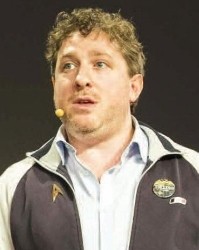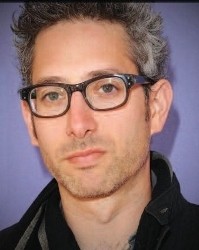Utopia Comes to Tel Aviv
When Uri Aviv was two years old, he looked up at the sky and said "yareach," the Hebrew word for 'moon.' It was the first word the infant, who started walking at seven months, ever uttered. For the next 30 years, Aviv's love for all things wonderful only increased as he switched from a science-fiction enthusiast to a sci-fi evangelist, organizing festivals and workshops culminating in Tel Aviv's Utopia Science-Fiction Festival which was held for the second year this summer.
Sci-fi is more than a bunch of technological whizzes winging their way over insurmountable obstacles to reach incredible aims, shooting from all manner of weird weaponry as they zing between oceans and sky and spectacularly burning buildings. According to Aviv, it is a platform for discussing technology and society, science and ethics, and providing perspectives on the future. Sci-fi, he claims, even drives technology forward.
"The book 1984, for example, was a metaphor," he explains, "which dealt with technology that at the time seemed impossible."
Today screens that beam faces around the globe, the ability of Big Brother to watch you and let you watch others (endlessly) is commonplace, as is the end of privacy as we almost remember it. More than that, the concept of "the other" – the one who doesn't conform, doesn't fit in, isn't the same as us – is more relevant than ever in our shrinking, yet increasingly fractured world.
And science fiction is an "Ideas Bazaar" – introducing concepts and complications into the real world. What if your boss was a robot? Can one have a sexual relationship with a computer? Is it ethical to create a race of slaves through genetic engineering? Should a mythological 'Maker' extend the lifespan of androids He created if they beg Him for mercy? The questions that sci-fi books and movies raise have philosophical and ethical ramifications on our own real-life issues, providing a window into the myriad questions that we grapple with daily.
In The Eternal Sunshine of the Spotless Mind, for example, a small mom-and-pop company called "Lacuna" sets up shop to erase bad memories from the minds of anyone who has suffered. The plot follows a couple who decide to delete their reminiscences of each other, after an acrimonious break-up. But as the recollections of good times spent with his former love are fading, the male partner decides he wants his good memories back … raising the premise of regret, and the value of pain, and whether it's better to have loved and lost than never to have loved at all.
Aviv, who studied physics and is a professional IT systems and requirements analyst, hopes to grow his annual Utopia Festival into a big international event. This year, the week-long happening included seven new Israeli films as well as a host of foreign ones, premieres and special screenings alongside lectures and conferences. Ten thousand participants, many of them from abroad, converged on Tel Aviv under the auspices of the nonprofit Utopia Association in collaboration with the Tel Aviv Cinematheque (which screened the films) and help from the Tel Aviv Municipality, the Israel Film Council and the Foreign Ministry. Tel Aviv University and the Interdisciplinary Center Herzliya also got into the act with an academic forum exploring the concept of robots in human society.
In addition, the festival teamed up with Tel Aviv DLD (Digital-Life-Design) Innovation Week which examines the role of technology in society. Are cell phones good for the Jews? Do Waze and Google and Facebook make us cognitively more capable, or turn us into computer dependent wimps? And what's next up in our speedily changing world – what science-fiction gadgets and gizmos will be mainstream must-haves before our children grow old?
But there is a constant, it seems, in spite of all this technology: children still have parents, and Jewish mothers do not change. American Jason Wishnow, one of the honored guests of the Festival, and a leading light in the phenomenally popular "Ted Talks" series, did not tell his own Jewish mom that he was visiting Israel. "Just before the trip", he explains from the comfort of his Tel Aviv hotel, "my dad called me and said: 'Your mother and I were talking and she doesn't want you to go to the Ukraine or Israel in the near future.' That was a few days before I left."
It could be a subject for a Talk: "Protecting Parents in Troublesome Times."
Wishnow, (whose much more Jewish sounding surname was changed when his grandparents arrived at Ellis Island from Europe), was the cameraman who can be credited with the then daring idea of putting "The Talks" onto the Internet. "People told me it would be professional suicide; they claimed that no-one would pay to be in the studio if they could see a talk for free, but I thought that if everyone could watch at their leisure and not at a specific time like on TV, that would be something different," recalls Wishnow.
And that was not his only innovation – he introduced the concept of wrap-around filming for the show, like a movie instead of a high-school one-camera take – and the rest is history. The Talks took off together with the newly invented YouTube; now almost half a million viewers watch every day. "My goal was to give someone sitting at their computer a sense of being in the best seat in the house", explains Wishnow. Far from turning people away from the live show, tickets for the studio audience are almost impossible to obtain.
So, just after the rockets stopped falling on our cities, Israel's city that never sleeps was hosting innovators like Wishnow, learning how to make the impossible happen. Now if all these clever brains converging in Tel Aviv could think of a sci-fi epic incorporating technology to create a Peace machine, a Live-and-Let-Live App that embeds itself into the brains of people while we sleep … wouldn't that be something? Maybe by next summer's session someone will have come up with a patent.










Comments